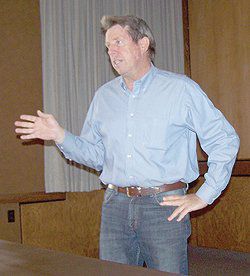Christine Jensen of Family and Consumer Science introduced the program by saying that Dennis Worwood would discuss container gardening and some options to look at such as drip irrigation and other ways of gardening instead of growing plants in rows in your back yard. USU Extension Agent for Emery County Dennis Worwood presented gardening using containers. Worwood was assisted by Christine Jensen and Barbra Jones who provided the lunch. Jones handed out a chart illustrating the four food groups needed for healthy living and 10 ways to build a healthy plate.
The title of Worwood’s program was Growing Vegetables in Containers. Worwood provided hand outs of container vegetable gardening from Iowa State University and a handout showing the slides shown during the program. He presented a list of Container Rules: Containers can be made of plastic, metal, ceramic or wood. Do not use treated lumber. Containers must have drainage holes in the bottom. Containers must be large enough to accommodate the intended vegetable plants. Put large containers in their intended location before adding the soil mix as the container will be heavy when filled with soil. In general, the bigger the container, the better. Large vegetable plants won’t perform well in small containers.
Large containers won’t need to be irrigated as often, because there is more soil for the roots to draw water from. Light colored containers may be best. Dark containers will absorb heat and can become too hot for the roots. Place containers where the plants will receive at least six hours of sun each day.
Worwood offered advice on choosing vegetable varieties. Almost any variety of vegetable will grow in a container. Most seed companies offer compact varieties that are ideal for container gardening.
Worwood offered tips on soil mix. Do not fill containers with regular garden soil. Garden soil will not drain properly and may swell and shrink as the soil is wetted and dries. Use regular potting soil. Worwood also discussed the different types of soil in our area and putting organic matter into the soil.
He provided information on irrigating and fertilizing the container garden. Potting soil must be able to drain. The smaller the container, the more often you will need to water your plants. This year may be dry and a container garden would use less water than a regular garden. Container grown plants must be fertilized more frequently than those growing in the garden. Use water soluble fertilizers that can be applied when you irrigate. Some fertilizer examples are 15 – 30 – 15 or 20 – 20 – 20. These numbers are used to represent nitrogen, phosphate and potash. Apply fertilizer every week or two.
Worwood then showed photos of container gardens. Some container gardens were in small and grow boxes. Some were in single and multi-layer containers. Some container gardens were in wash tubs and water troughs. Others were in water bottles hanging on a fence. One container garden shown was in an abandoned automobile.
Worwood talked of his experience growing Georgia Jet sweet potatoes, tomatoes and potatoes in old automobile tires.
The subject of protecting corn from coons, cats and skunks was mentioned. Worwood said he has caught five raccoons so far this year and 19 last year. He said an electric fence of three or four strands will help keep them out. A big dog or a tall fence will help protect the garden from deer.
Worwood thanked everyone for their comments and said we may have a little more water this year than we think, but expect to see water restrictions.
Gardening in containers at Festive Friday

"Dennis Worwood."
